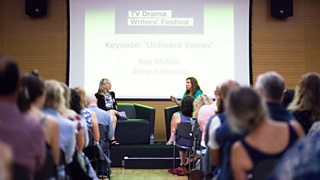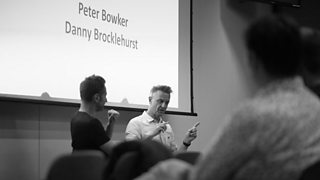主播大秀 Writersroom TV Drama Writers' festival 2016: Unheard Voices
Hannah Khalil
Digital Content Producer, About The 主播大秀 Blog
Tagged with:

主播大秀 Writersroom's Anne Edyvean talking to screenwriter Kay Mellor
On Monday 18 July 主播大秀 Writersroom held their TV Drama Writers' festival, a spectacular event bringing together established and emerging television writers alike. Anyone with a television broadcast credit was welcome to attend the day which was hosted by UAL Central St Martin’s in London’s Kings Cross. This year the theme – put forward by keynote speaker Kay Mellor - was “Unheard Voices”.
I’ve been to Writersroom TV Drama Festivals before and there’s only one problem with them: my inability to clone myself and be in two places at once. As you’ll see from the full list of sessions at the bottom, there were an array of well-known writers talking on an wide list of subjects. And with some sessions happening simultaneously decisions had to be made. 主播大秀 Blue Room were also in attendance showcasing some of the work they are doing that would be of interest to writers.
This blog is a round-up of the sessions I attended – apply as the event is intended to be a safe space for writers to share thoughts and opinions – and post the full list of talks at the bottom. Please feel free to share your experiences of particular sessions in the comment section.
The day opened with the head of 主播大秀 Writersroom Anne Edyvean talking to screenwriter Kay Mellor (Band of Gold, The Syndicate, In the Club). The first question was: “How important is it for writers to get together and talk?”. Kay asserted it was a very important thing to do to give writers courage, especially as they often spend so much time writing in isolation. Kay explained she chose the theme of Unheard Voices because – now more than ever – it was important for drama to be writer-led, and commissioners need to be brave and dare to do something a bit different that might fall outside of the standard genres we see on TV. Kay asserted things are getting better in terms of unheard voices, but that progress hasn’t been consistent. She went on to say that in the time she has been writing she’s seen respect grow for the writer within the television process, which is right as their work is the ‘acorn’ from which the big trees of television drama grow.
Next I headed into Telling today’s secret stories – creating drama from factual events with speakers Vinay Patel (Murdered by my Father) and Brian Fillis (The Cure of Steptoe, Fear of Fanny), 主播大秀 Head of Documentary Production Aysha Rafaele chaired the discussion. There was a discussion around the difference between dramatising fact and reportage and the question was raised about whether a writer’s responsibility was to the person portrayed or their family or to the truth. “There’s an appetite for truth, people like to feel they’ve been watching the truth and that puts huge responsibility on the writer’s plate”. But it was agreed that telling the ‘true story’ can problematic in dramatic terms because it is not neat – so shaving off and editing is often necessary.
The question was raised – “why write a drama about real people – why not a documentary?” and it was suggested that sometimes “people want to be moved as well as informed”. A writer in the audience asked if there was someone you wanted to write about who was still alive, what was the best course of action. The panel agreed approaching them directly was key, as was making sure the person in question was assured their voice would be heard in the project.

Danny Brocklehurst and Peter Bowker
Peter Bowker (The A Word, Marvellous) and Danny Brocklehurst (Ordinary Lies, Shameless) speaking on How I Pitch were next on my list. It was a very entertaining session (the pair should consider a double act for sure) but extremely open and informative too. It’s worth saying at this point, that one stand out thing from the day was the spirit of honesty and generosity from all the speakers who were giving up their time for free to share their experience with the festival goers. It was incredible.
But back to Bowker and Brocklehurst, they kicked off the session saying pitching was a crazy thing to ask writers to do: “We become writers because we are socially inadequate and then they make us stand up and talk to a room full of people”. I’m sure all the writers in the room were reassured to know even very established people feel the fear too.
They agreed there are two styles of pitching: “a slick, American style, and the British way: self depreciating with a touch of irrepressible ego.”
Top tips included: don’t over-rehearse or learn it by heart – you need to be able to be spontaneous, tell the story you want to tell, be yourself, know the emotional heart of the piece, also have a sense of its shape (single, returner, three-part) and have a connection to the material – executives often want to know what’s driven you to want to write this story. In addition, having a one (to two) page document that outlines the idea, “sells the sizzle” and why you think it’s going to brilliant is vital and if you haven’t got it to them before the meeting be sure to have a copy for them to see afterwards. It needs to leap off the page, sell the ideas, outline themes and detail where you are going to take it. The good programme makers want to know what you want to write and why you want to write it.
Finally never believe it is an informal meeting – know who you are pitching to and what they’ve made so you don’t inadvertently criticise something of theirs. And know the ‘TV landscape’ be ready to talk about the shows you love and why. All excellent advice.
Everyone went into the main lecture hall at this point to see 主播大秀 Director-General Tony Hall and Kay Mellor in conversation. Tony thanked all the writers in the room saying “it’s the quality of programming that brings people back to the 主播大秀 … it’s the best advocate for the 主播大秀”. He also repeated his commitment for the 主播大秀 to be in the regions even more and said the new Drama Commissioner for Scotland would be announced imminently.
After lunch I attended Bringing new stories to mass audiences – writing for continuing drama series: with Mark Catley; Lauren Klee; Claire Bennett; Jon Sen and chaired by Rosalynd Ward. All the writers speaking had experience of the 主播大秀’s continuing dramas: Doctors, Casualty, EastEnders and Holby City.
Interesting things discussed in this session included diversity and the great track record of all of these shows, especially Holby City – in front of and behind the camera. The veteran writers advised that when it came to the complex idea of individual voices within the context of a continuing drama that you needed to know and love the show you were writing on, but then when writing a script try to forget what you are writing for and just be truthful and yourself. The differences of style and rhythm between the shows was also highlighted and some stereotypical ideas put to bed – for example that because Doctors is a Daytime show it has to cover ‘safe’ topics, Claire Bennett listed a host of themes covered by the show recently that completely flouted that idea.
I couldn’t resist Writing – how to survive the failure and rejection! As I knew the panellists Sarah Phelps; Peter Bowker; Alice Nutter; Tim Prager and chair Simon Nelson were bound to have some juicy anecdotes. I wasn’t disappointed and , they all agreed even as established writers rejection hurts: “you have to have a thin skin to be able to write but a thick skin to take the criticism and rejection”. Top line advice from the professionals was: you never know what’s going to come out of failures – often you can reuse any material you’ve created so nothing’s ever wasted, and it’s important to remember that as the creator of a story you are in a powerful position and if you aren’t happy you can say ‘No’. Reassuring stuff.
A very entertaining, inspiring and somewhat sweary session came next in 10 Years on from Pulling: with Dennis Kelly and Sharon Horgan. I laughed a lot in this hour and also learned two new terms: one for comedy drama - “dramedy”, and “scriptment” which is apparently half way between a “treatment” and a script – a sort of fleshed out story document with dialogue inserted into it.
And suddenly it was the last event of the day: Frank Spotnitz (X-Files, Man in the High Castle) in conversation with 主播大秀 Head of Drama England, Chris Aird. Not only was it fascinating to learn how Frank got his first break (he met Chris Carter the creator of The X-Files at a reading group) it was inspiring to hear his assertion that this is a great time for television drama as there is a desire for challenging, surprising work. That said he stressed that it is still hard and described writing as “an act of communication” that required a strong work ethic and an ability to collaborate. He talked about the difference between TV in the US (primarily commercial) and the UK (“being good is more important than being popular – but that makes judging success more difficult”). He also talked a little about the ‘writers room’ system in the US that is less common in the UK.
He went on to explain why he loves and now works in the UK: “I love the 主播大秀... There's nothing that even comes close… My god! You (the British) have drama on radio you actually listen to! You talk about poetry... that's why I love your culture!”
The full schedule from the 主播大秀 Writersroom TV Drama Festival 2016 is below:
主播大秀 Writersroom TV Drama Festival 2016 – Full Schedule
- Anne Edyvean in conversation with Kay Mellor OBE
- Renewing old voices – the art of writing adaptation: Simon Nye; Peter Straughan; Sarah Phelps, CHAIR: Roanna Benn
- Undercover – researching & creating a series: Richard Stokes face to face with Peter Moffat
- Telling today’s secret stories – creating drama from factual events: Vinay Patel; Brian Fillis, CHAIR: Aysha Rafaele
- Finding your voice in a competitive market: Tom Edge, Liz Kilgarriff, Murray Ferguson and Faith Penhale, CHAIR: Louise Mountain
- How I pitch: Peter Bowker and Danny Brocklehurst
- What is the Writer’s duty to write diverse characters? Vinay Patel; Tim Prager: CHAIR: Joyce Adeluwoye-Adams
- Wolf Hall: Kate Rowland face to face with Peter Straughan
- Keynote: Kay Mellor in conversation with Tony Hall, 主播大秀 Director-General
- So you want to write a Feature? Beth Pattinson in conversation with Andrea Gibb
- Shout Out For Kids: UK Childrens’ Drama Takes On The World: Jeff Norton; Rebecca Hodgson; Emma Reeves; David Chikwe CHAIR: Sarah Muller
- Bringing new stories to mass audiences – writing for continuing drama series: Mark Catley; Lauren Klee; Claire Bennett; Jon Sen, CHAIR: Rosalynd Ward
- Digital Storytelling: Marnie Dickens, Ed Sellek, Inua Ellams, CHAIR: Simon Lumb
- Refreshing and Renewing – how to keep a series exciting: Jed Mercurio; Simon Heath, CHAIR: Danny Brocklehurst
- Daytime – the new Primetime: Claire Bennett, Sally Abbott; Rob Kinsman, CHAIR: Ceri Meyrick
- Writing – how to survive the failure and rejection! Sarah Phelps; Peter Bowker; Alice Nutter; Tim Prager ,CHAIR: Simon Nelson
- Writing Animation: Reid Harrison, Ben Ward, Tobi Wilson, CHAIR: Andrew Burrell
- Showrunning: Frank Spotnitz; Jed Mercurio; Simon Allen; Russell T Davies, CHAIR: Jess Pope
- 10 Years on from Pulling: Dennis Kelly & Sharon Horgan, CHAIR: Abigail Gonda
- Keynote – Frank Spotnitz in conversation with Chris Aird
- See
- Read also
